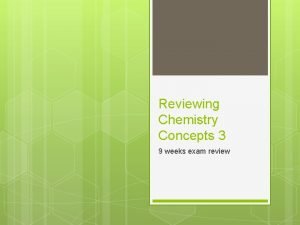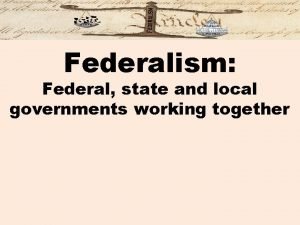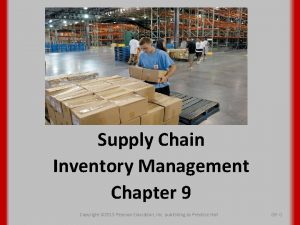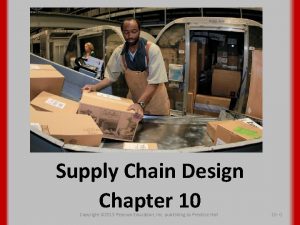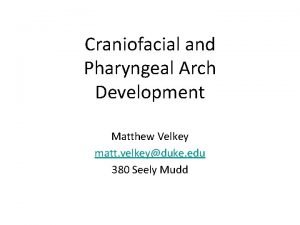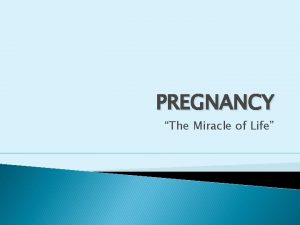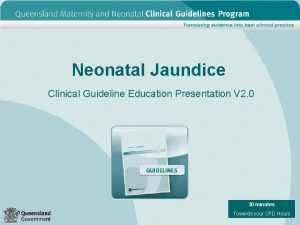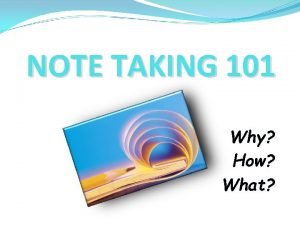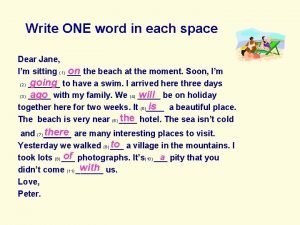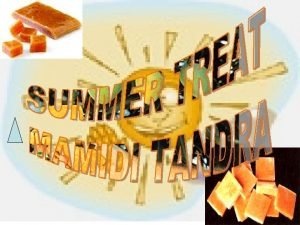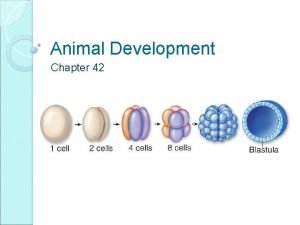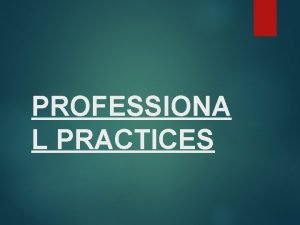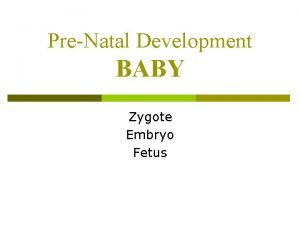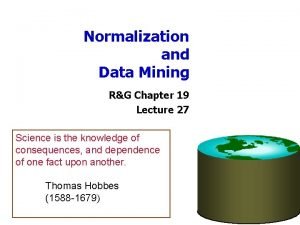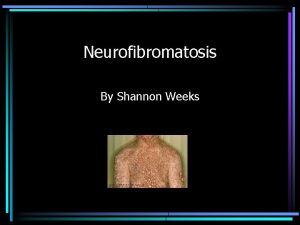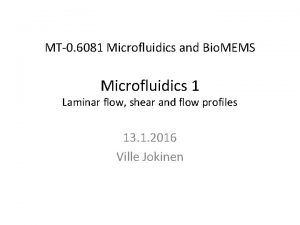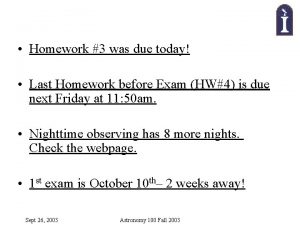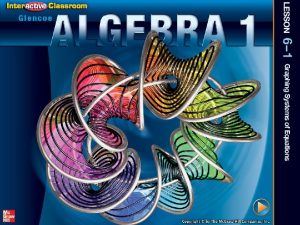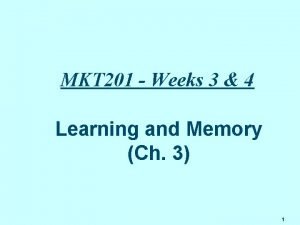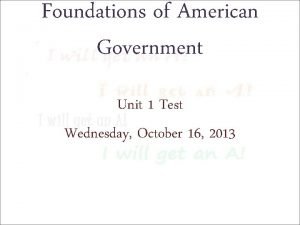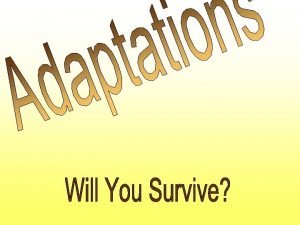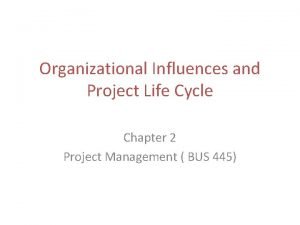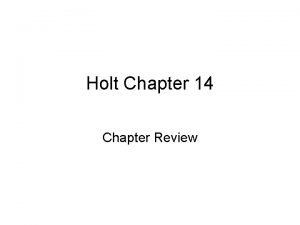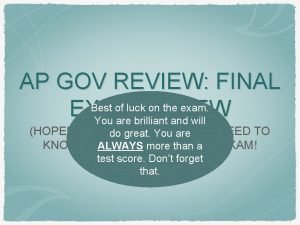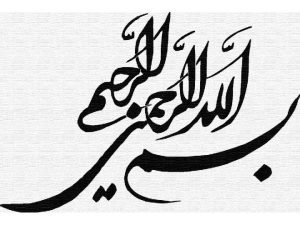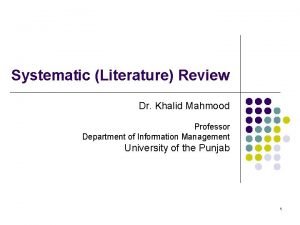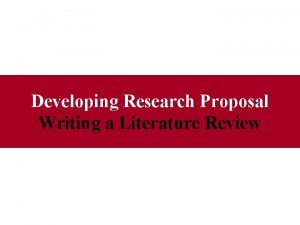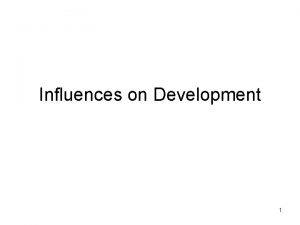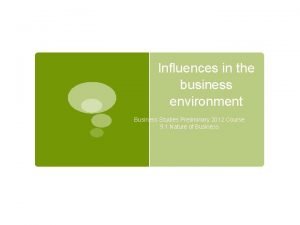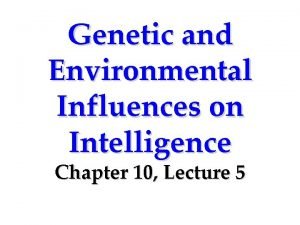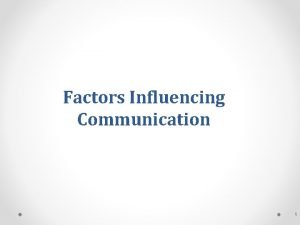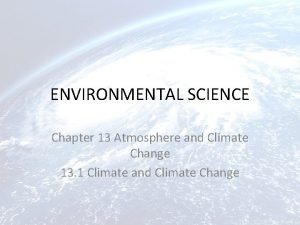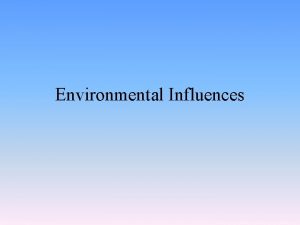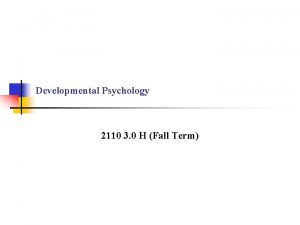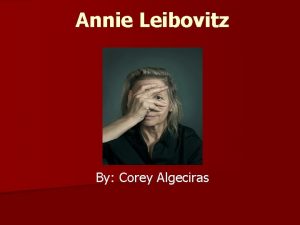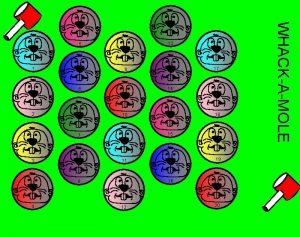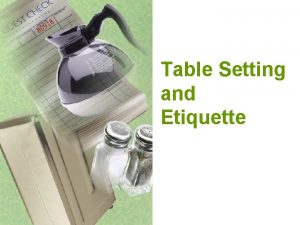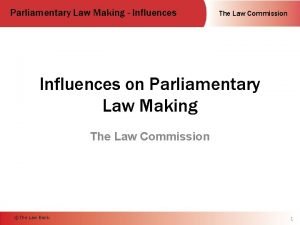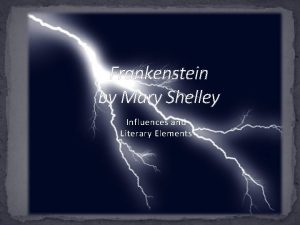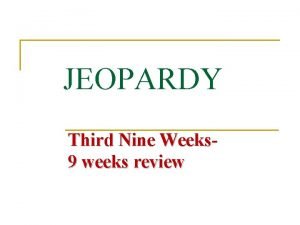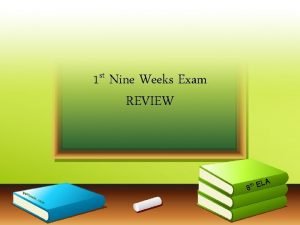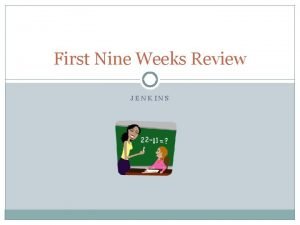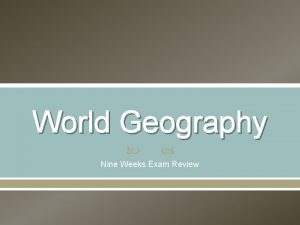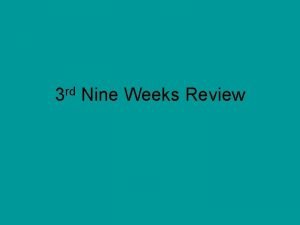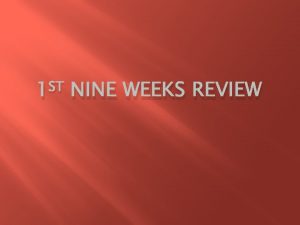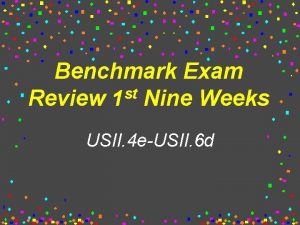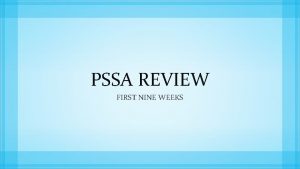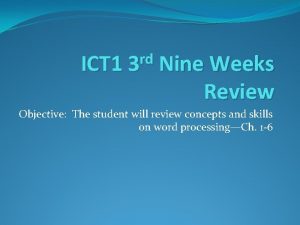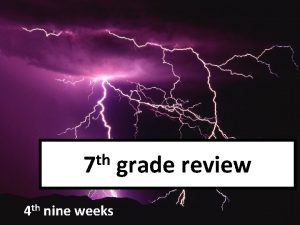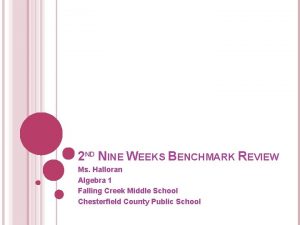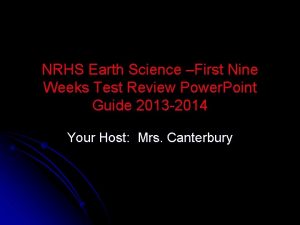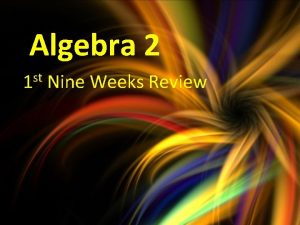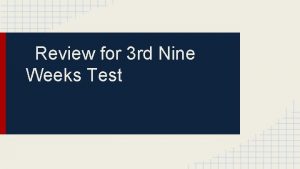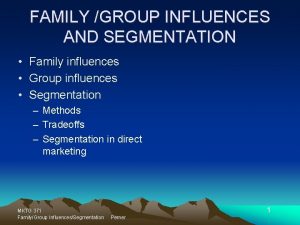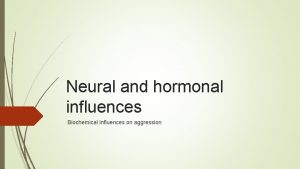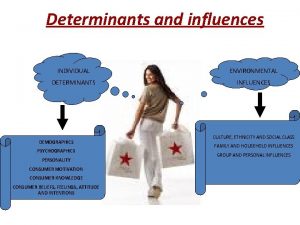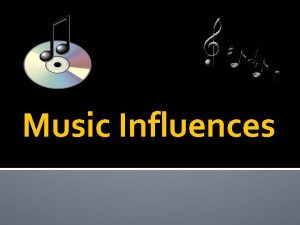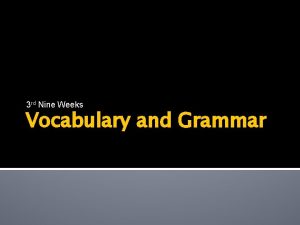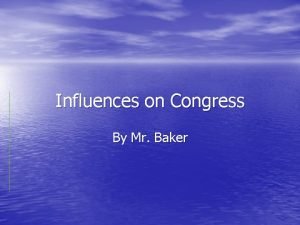nd 2 Nine Weeks Review Government And Influences

























































- Slides: 57

nd 2 Nine Weeks Review Government And Influences on…

1. Explain the concept of a “protective tariff. ” • A tax added to a foreign good to encourage people to buy American products.

2. Explain the system of checks and balances established by the Constitution – What is “checks and balances? ” What is it designed to do? Give an example. • When each branch of the government checks to make sure the other branches don’t abuse their power. • Example: Congress passes a crazy law… the President vetos it.

3. Why is freedom of the press so important in a “free society? ” • It gives the people knowledge about our government. If something is wrong, we can try to fix it. Otherwise…we would continue to live in a messed up country forever.

4. How does the U. S. Constitution help maintain a republican system of government in the U. S. ? • The Republican system is about electing REPRESENTATIVES to help govern us. The U. S.

5. The Founding Fathers of the United States were models of civic virtue because the… • Men who wrote the constitution spent their time working on something that would benefit the “Greater good” not just something to help themselves.

6. King John of England signed the Magna Carta in 1215. What ideas did the Founding Fathers borrow from this document to include in the Bill of Rights? • That all people should have the right to trail by jury of their peers instead of having just the King decide your fate.

7. What are the FIVE rights in the First Amendment? (have these memorized) • The Freedoms of Speech, Religion, Press, Assembly, and Petition

8. Who was John Peter Zenger? • A newspaper publisher during the colonial days who published TRUE, but damaging things about the governor.

9. What happened to John Peter Zenger? • He was placed in jail for publishing bad, but true, stuff about the governor.

10. What right appears in the Bill of Rights because of his experience? • Freedom of the press! (of course)

11. The first ten amendments to the U. S. Constitution were designed to • Protect our individual rights aka our unalienable rights!

12. Explain the process of how the Constitution can be amended (changed). • EITHER, 2/3 rds of the Congress OR States propose the amendment AND ¾ of the states or Congress must approve the amendment.

13. What powers are included in the judicial branch? What courts are included in the judicial branch? • The judicial branch INTERPRETS the law – that means they check laws to see if they are CONSITUTIONAL and FAIR. The supreme court is in the judicial branch.

14. Explain the problem that resulted in the “Great Compromise. ” What was it? How was it solved? No complainin’! Just answer the questions! • The Great Compromise was about how each state would be represented in congress (how many votes – and power – each state would get). • New Jersey (small states) and Virginia (big states) • Created 2 (count ‘em) 2 parts to Congress: The House of Representatives and the Senate.

15. Explain the 3/5 ths Compromise. What was it? What was the argument? Who was arguing. How was it solved? • Southern states wanted to count slaves in the population to get more votes in Congress – Northern states didn’t…but wanted to count them as property so the South would have to pay taxes on them. • So…only count 3 of every 5 slaves as people for votes in Congress and property for taxes.

16. Which British law enacted on the American colonies led to the Third Amendment to the U. S. Constitution? • The Quartering Act

17. What is an “amendment? ” • What? You don’t know? Get Out! • A change or addition. You know to the Constitution… like a “p. s. ” in your love letters you write in class instead of the notes you should be writing so you would know the answer to this stupid question!

18. Why did the Framers of the U. S. Constitution intentionally make the amendment process difficult? • So people wouldn’t be changing it all the time for dubious (ridiculous) reasons. Like an amendment to make flag burning illegal or an amendment to say that marriage is a union between a man and a women. • what? Did I go to far?

19. What is the significance of the Mayflower Compact? • It was the first time English people in the new world (America) created “self government”…rules without the king telling them what to do.

• 20. Since the number of representatives states sent to Congress was based on each state’s population, smaller states felt they were being cheated. To appease the smaller states, the Great Compromise provided for A two part Congress ______________.

21. Shays’ the Rebellion helped lead to • Constitutional Convention to fix the cruddy government

22. What is a “republican system of government? ” • When we VOTE in REPRESENTATIVES to do the job of governing for us. • Cause you know we don’t have the time to take off work, fly to D. C. , study the relevant facts in the bill, attend committee meetings, get barfed on my some junior member of the Senate and, vote… and do it all over again tomorrow.

23. Explain the concept of “separation of powers” in the Constitution. What is it? Why is it important? Give an example of how it works. • When we split the power of the government into three, equal, parts. • So no one group or person takes all the power for themselves and begins to abuse our rights • Legislative makes laws, Executive enforces laws, and Judicial interprets laws

24. What did the U. S. ’ weaknesses in the Articles of Confederation and Shays’ Rebellion lead to? • The CONSTITUTION!!!! • We the people…

25. Which term best describes the major elements of the American economy, in which competition, profit, private property, and economic freedom are emphasized? • Free enterprise! (When people can make their own decisions about what to produce [make] or consume [use] without government interference).

26. What was the purpose of the Northwest Ordinance? • To come up with an orderly way to settle the Northwest Territory (the land the U. S. got from England after winning the Revolution) and eventually lead to statehood.

27. How did the United States solve the problem of weak central government under the Articles of Confederation? • We created a Constitution with a strong national government

28. Explain what is meant by “We hold these truths to be selfevident, that all men are created equal, that they are endowed by their creator with certain Unalienable Rights”. • Some things are OBVIOUS…like we are all the same and have rights given to us by god.

29. In what document would you find that quote? • I would find it in the Declaration of Independence…where would you find it?

30. Who wrote that document? • TJ • Thomas Jefferson

31. Which of event occurred in 1787? • In 1787 I’m told our Founding Fathers did agree, to write a list of principles for keepin’ people free… The U. S. A. was just starting out a whole brand new country…and so, our people spelled it out the things that we should be…and they called it the… • Constitution – sing it!

32. What type of national government did the Federalists want? • A good one? • A STRONG one with lots of powers and responsibilities and stuff.

33. Explain the Navigation Acts. Why were they used? CREATE A SIMPLE MAP to show the trade route under the Navigation Acts. • The King’s economic policy that allowed the colonies to trade ONLY with ENGLAND. • It kept all the MONEY and PROFIT with the King

33. Explain the Navigation Acts. Why were they used? CREATE A SIMPLE MAP to show the trade route under the Navigation Acts. ls a i r te a m w a R ed r u ct M a f u an s d goo

34. Describe the land owned by the United States after the Treaty of Paris (what is the western border to U. S. land? ) • All the land EAST of the Mississippi River to the Atlantic Ocean

35. Explain the system of “federalism” under the Constitution. • Federalism is when the Federal government (Washington D. C. ) and the State government (Austin, Texas) SHARE the power to govern us.

36. Who was considered the “father” of the Constitution? • Duh! • James Madison! • Also the 4 th president of the United States

37. Protection of the unalienable rights referred to in the Declaration of Independence is provided for in the • Bill of Rights mon!

38. The Proclamation of 1763 prohibited colonial settlement west of a border that ran roughly along the • Appalachian mountains, mon.

39. Name four of the “roots of representative government” in U. S. history. • • • Magna Carta English Bill of Rights Mayflower Compact House of Burgesses Fundamental Orders of Connecticut

40. Describe the function of the Northwest Ordinance. • A law that would help new U. S. territories to become states. • It leads to “statehood. ”

41. One of the most important problems facing the Constitutional Convention of 1787 was how to balance the • powers of the federal government with the state government

42. Which First Amendment right protects citizens who are staging a protest outside a government building? • Freedom of ASSEMBLY!!!!

43. The Federalist Papers, written by John Jay, Alexander Hamilton, and James Madison in 1787, supported • A strong national government in the Constitution.

44. List the advantages the American colonists had over the British in the American Revolution. • Fighting on own land • Using Indian tactics (guerilla warfare) • French navy helping.

45. The tax laws that were imposed on the colonists by the British government were viewed as unfair and created support for declaring independence because • They were taxed without colonial representation in the British parliament.

46. What power given to the congress in the Constitution was specifically intended to prevent the president from acting against the will of the people? • The power to write laws (that’s what they do, right? )

47. Which principle of government is illustrated by creating three branches of government in our Constitution? • Separation of Powers.

48. Describe the concept of a “confederation. ” • A ‘loosely’ organized group of states that are more independent than they are connected to one another.

49. The U. S. Constitution provides that each state be represented in the House of Representatives according to the state’s • population!, mon.

50. Which amendment would most likely be used to argue against police officers randomly searching homes? (tell the number and briefly describe the right) • 4 th Amendment – Protection from unreasonable search and seizure.

51. Who or what held all the power in the Articles of Confederation? • The states.

52. Who were the Anti-Federalists AND what did they want? • They opposed ratifying (approving) the new Constitution and wanted to add a Bill of Rights

53. How does the U. S. Constitution allow the government to raise money? • By allowing Congress to directly tax the people.

54. What were the two positive things that the Articles of Confederation were able to process? • They got America through the Revolution AND • Passed the Northwest Ordinance.

LAST ONE!!!!! 55. After an amendment to the U. S. Constitution has been proposed by Congress or a national convention, it can be ratified by The States. ______________. (who? )
 3rd 9 weeks exam review chemistry
3rd 9 weeks exam review chemistry What are the three levels of government
What are the three levels of government Words that rhyme with weeks
Words that rhyme with weeks Weeks of supply formula
Weeks of supply formula Weeks of supply formula
Weeks of supply formula Antenatal investigations
Antenatal investigations Max caplin clinic
Max caplin clinic 5 to 6 weeks
5 to 6 weeks Four weeks prior to christmas
Four weeks prior to christmas 8 weeks pregnant ultrasound
8 weeks pregnant ultrasound Pathologic jaundice newborn
Pathologic jaundice newborn Gestational age in weeks
Gestational age in weeks This week's lesson
This week's lesson According to walter pauk, 10 weeks after lecture
According to walter pauk, 10 weeks after lecture Bma bank holiday lieu days
Bma bank holiday lieu days Complete each space with one word
Complete each space with one word Flocabul;ary
Flocabul;ary Mamidi tandra takes weeks of hard work
Mamidi tandra takes weeks of hard work 8 weeks embryo
8 weeks embryo Two week notice letter example
Two week notice letter example Fetus at 15 weeks pictures
Fetus at 15 weeks pictures Normalization in data mining
Normalization in data mining Shannon weeks
Shannon weeks 3 weeks from today
3 weeks from today Iron core
Iron core How many weeks
How many weeks 201 weeks
201 weeks Youtube.com
Youtube.com 4 weeks before christmas
4 weeks before christmas American government unit 1 study guide
American government unit 1 study guide Foundations of american government unit 1 test review
Foundations of american government unit 1 test review Discuss the environment that surrounds
Discuss the environment that surrounds Project life cycle structures
Project life cycle structures Influences on parliamentary law making
Influences on parliamentary law making Chapter review motion part a vocabulary review answer key
Chapter review motion part a vocabulary review answer key Ap gov review final exam review
Ap gov review final exam review Narrative review vs systematic review
Narrative review vs systematic review Example of inclusion and exclusion criteria
Example of inclusion and exclusion criteria Narrative review vs systematic review
Narrative review vs systematic review Bob fosse influences
Bob fosse influences Major influences on business buyer behavior
Major influences on business buyer behavior Roy lichtenstein influences
Roy lichtenstein influences Difference between objective and subjective
Difference between objective and subjective Internal influences on a business
Internal influences on a business Environmental influences
Environmental influences Determinants of levels of communication
Determinants of levels of communication Latitude strongly influences climate because
Latitude strongly influences climate because Environmental influences
Environmental influences Normative age graded influences
Normative age graded influences Social influences on consumer behavior
Social influences on consumer behavior Annie leibovitz education
Annie leibovitz education Analyzing influences meaning
Analyzing influences meaning Pronatalist pressure
Pronatalist pressure Proper table setting worksheet
Proper table setting worksheet Example of cultural influences
Example of cultural influences Influences on parliamentary law making
Influences on parliamentary law making Salty sour
Salty sour Frankenstein literary elements
Frankenstein literary elements
